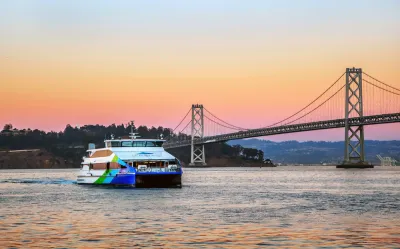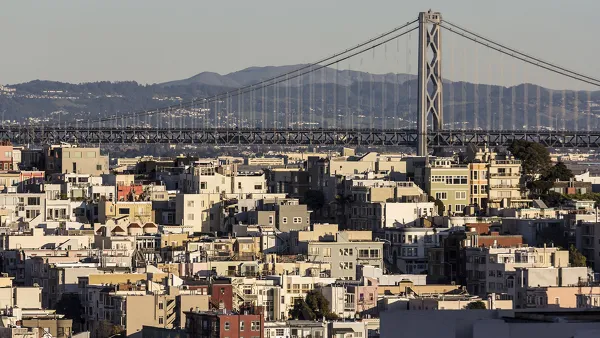A drastic and unprecedented measure included in the draft Plan Bay Area 2050, released this summer, would require 60 percent of all workers in Bay Area office jobs to telecommute.

"In the face of protests from San Francisco officials and advocates of public transit, the Metropolitan Transportation Commission on Wednesday moved forward with a plan to keep many of the region’s workers at home — with climate change, not the coronavirus pandemic, as the rationale," reports Roland Li in a paywalled article for the San Francisco Chronicle.
Specifically, the MTC "voted to include the controversial mandate that large Bay Area employers keep 60% of their workers home each workday as part of a 2050 planning strategy to reduce greenhouse gas emissions and traffic congestion," according to Li.
An article by Laura Bliss for Bloomberg CityLab provides additional analysis of the implications of mandated telecommuting policies.
"The remote-work order is one of 35 strategies in Plan Bay Area 2050, the group’s 30-year roadmap to guide regional transportation funding, as required by state and federal law. The work-from-home directive aims to bring the region’s climate-changing carbon emissions down," writes Bliss to summarize the MTC's rationale for the work-from-home mandate.
The MTC released the draft Plan Bay Area 2050 in July of this year, but the telecommute mandate escaped scrutiny at the time. More detail on the mandate follows:
The 60% benchmark for office workers was designed to bring the telecommute share of the region’s overall workforce as high as 25%, Matt Maloney, the commission’s regional planning director, said during the meeting. With a goal to achieve a 19% reduction in per capita greenhouse gases by 2035, the blueprint’s strategies “must be ones that local governments are poised to deliver,” he said. The telecommuting strategy, Maloney said later, was “one of the most necessary pieces.”
The plan did provoke criticism during its hearing, according to Bliss.
Nick Josefowitz, an MTC commissioner who works as the director of policy at the urbanism think tank SPUR, said that such a mandate would end up punishing workers who share crowded homes with roommates and family members, especially in an exorbitantly expensive housing market with scant inventory. He also questioned the emphasis on telecommuting rather than on non-polluting modes of transport, and warned of impacts on businesses and government coffers that rely on daily infusions of workers.
Bliss's coverage provides many more soundbites from the debate surrounding the telecommuting mandate, and also adds some perspective about the limitations of Plan Bay Area 2050, which would require enabling legislation to enforce each of its many components. "Still, a government-backed work-from-home policy at this scale would be a first for U.S. climate policy, and the mandate’s appearance on this planning document is a landmark in a year of upheaval in the realm of transportation — and in the wake of a summer of environmental catastrophe in California," writes Bliss.
FULL STORY: The Murky Case for Mass Telecommuting

Analysis: Cybertruck Fatality Rate Far Exceeds That of Ford Pinto
The Tesla Cybertruck was recalled seven times last year.

National Parks Layoffs Will Cause Communities to Lose Billions
Thousands of essential park workers were laid off this week, just before the busy spring break season.

Retro-silient?: America’s First “Eco-burb,” The Woodlands Turns 50
A master-planned community north of Houston offers lessons on green infrastructure and resilient design, but falls short of its founder’s lofty affordability and walkability goals.

Test News Post 1
This is a summary

Analysis: Cybertruck Fatality Rate Far Exceeds That of Ford Pinto
The Tesla Cybertruck was recalled seven times last year.

Test News Headline 46
Test for the image on the front page.
Urban Design for Planners 1: Software Tools
This six-course series explores essential urban design concepts using open source software and equips planners with the tools they need to participate fully in the urban design process.
Planning for Universal Design
Learn the tools for implementing Universal Design in planning regulations.
EMC Planning Group, Inc.
Planetizen
Planetizen
Mpact (formerly Rail~Volution)
Great Falls Development Authority, Inc.
HUDs Office of Policy Development and Research
NYU Wagner Graduate School of Public Service




























